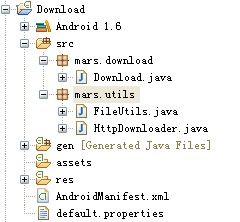
Download.java
package mars.download;
import mars.utils.HttpDownloader;
import android.app.Activity;
import android.os.Bundle;
import android.view.View;
import android.view.View.OnClickListener;
import android.widget.Button;
public class Download extends Activity {
/** Called when the activity is first created. */
private Button downloadTxtButton;
private Button downloadMp3Button;
@Override
public void onCreate(Bundle savedInstanceState) {
super.onCreate(savedInstanceState);
setContentView(R.layout.main);
downloadTxtButton = (Button)findViewById(R.id.downloadTxt);
downloadTxtButton.setOnClickListener(new DownloadTxtListener());
downloadMp3Button = (Button)findViewById(R.id.downloadMp3);
downloadMp3Button.setOnClickListener(new DownloadMp3Listener());
}
class DownloadTxtListener implements OnClickListener{
public void onClick(View v) {
HttpDownloader httpDownloader = new HttpDownloader();
String lrc = httpDownloader.download("http://192.168.1.107:8080/voa1500/a1.lrc");
System.out.println(lrc);
}
}
class DownloadMp3Listener implements OnClickListener{
public void onClick(View v) {
// TODO Auto-generated method stub
HttpDownloader httpDownloader = new HttpDownloader();
int result = httpDownloader.downFile("http://zhangmenshiting.baidu.com/data/music/7272780/%E5%A6%82%E6%A2%A6%E4%BB%A4.mp3?xcode=9f54f35833d12b0e4bd29ebbbfef7ca5", "voa/", "a1.mp3");
System.out.println(result);
}
}
}
FileUtils.java
package mars.utils;
import java.io.File;
import java.io.FileOutputStream;
import java.io.IOException;
import java.io.InputStream;
import java.io.OutputStream;
import android.os.Environment;
public class FileUtils {
private String SDPATH;
public String getSDPATH() {
return SDPATH;
}
public FileUtils() {
//得到当前外部存储设备的目录
// /SDCARD
SDPATH = Environment.getExternalStorageDirectory() + "/";
}
/**
* 在SD卡上创建文件
*
* @throws IOException
*/
public File creatSDFile(String fileName) throws IOException {
File file = new File(SDPATH + fileName);
file.createNewFile();
return file;
}
/**
* 在SD卡上创建目录
*
* @param dirName
*/
public File creatSDDir(String dirName) {
File dir = new File(SDPATH + dirName);
dir.mkdirs();
return dir;
}
/**
* 判断SD卡上的文件夹是否存在
*/
public boolean isFileExist(String fileName){
File file = new File(SDPATH + fileName);
return file.exists();
}
/**
* 将一个InputStream里面的数据写入到SD卡中
*/
public File write2SDFromInput(String path,String fileName,InputStream input){
File file = null;
OutputStream output = null;
try{
creatSDDir(path);
file = creatSDFile(path + fileName);
output = new FileOutputStream(file);
byte buffer [] = new byte[4 * 1024];
while((input.read(buffer)) != -1){
output.write(buffer);
}
output.flush();
}
catch(Exception e){
e.printStackTrace();
}
finally{
try{
output.close();
}
catch(Exception e){
e.printStackTrace();
}
}
return file;
}
}
HttpDownLoader.java
package mars.utils;
import java.io.BufferedReader;
import java.io.File;
import java.io.IOException;
import java.io.InputStream;
import java.io.InputStreamReader;
import java.net.HttpURLConnection;
import java.net.MalformedURLException;
import java.net.URL;
public class HttpDownloader {
private URL url = null;
/**
* 根据URL下载文件,前提是这个文件当中的内容是文本,函数的返回值就是文件当中的内容
* 1.创建一个URL对象
* 2.通过URL对象,创建一个HttpURLConnection对象
* 3.得到InputStram
* 4.从InputStream当中读取数据
* @param urlStr
* @return
*/
public String download(String urlStr) {
StringBuffer sb = new StringBuffer();
String line = null;
BufferedReader buffer = null;
try {
// 创建一个URL对象
url = new URL(urlStr);
// 创建一个Http连接
HttpURLConnection urlConn = (HttpURLConnection) url
.openConnection();
// 使用IO流读取数据
buffer = new BufferedReader(new InputStreamReader(urlConn
.getInputStream()));
while ((line = buffer.readLine()) != null) {
sb.append(line);
}
} catch (Exception e) {
e.printStackTrace();
} finally {
try {
buffer.close();
} catch (Exception e) {
e.printStackTrace();
}
}
return sb.toString();
}
/**
* 该函数返回整形 -1:代表下载文件出错 0:代表下载文件成功 1:代表文件已经存在
*/
public int downFile(String urlStr, String path, String fileName) {
InputStream inputStream = null;
try {
FileUtils fileUtils = new FileUtils();
if (fileUtils.isFileExist(path + fileName)) {
return 1;
} else {
inputStream = getInputStreamFromUrl(urlStr);
File resultFile = fileUtils.write2SDFromInput(path,fileName, inputStream);
if (resultFile == null) {
return -1;
}
}
} catch (Exception e) {
e.printStackTrace();
return -1;
} finally {
try {
inputStream.close();
} catch (Exception e) {
e.printStackTrace();
}
}
return 0;
}
/**
* 根据URL得到输入流
*
* @param urlStr
* @return
* @throws MalformedURLException
* @throws IOException
*/
public InputStream getInputStreamFromUrl(String urlStr)
throws MalformedURLException, IOException {
url = new URL(urlStr);
HttpURLConnection urlConn = (HttpURLConnection) url.openConnection();
InputStream inputStream = urlConn.getInputStream();
return inputStream;
}
}
Main.xml
<?xml version="1.0" encoding="utf-8"?>
<LinearLayout xmlns:android="http://schemas.android.com/apk/res/android"
android:orientation="vertical"
android:layout_width="fill_parent"
android:layout_height="fill_parent"
>
<Button
android:id="@+id/downloadTxt"
android:layout_width="fill_parent"
android:layout_height="wrap_content"
android:text="下载文本文件"
/>
<Button
android:id="@+id/downloadMp3"
android:layout_width="fill_parent"
android:layout_height="wrap_content"
android:text="下载MP3文件 "
/>
</LinearLayout>
AndroidManifest.xml
<?xml version="1.0" encoding="utf-8"?>
<manifest xmlns:android="http://schemas.android.com/apk/res/android"
package="mars.download"
android:versionCode="1"
android:versionName="1.0">
<application android:icon="@drawable/icon" android:label="@string/app_name">
<activity android:name=".Download"
android:label="@string/app_name">
<intent-filter>
<action android:name="android.intent.action.MAIN" />
<category android:name="android.intent.category.LAUNCHER" />
</intent-filter>
</activity>
</application>
<uses-sdk android:minSdkVersion="4" />
<uses-permission android:name="android.permission.INTERNET"/>
<uses-permission android:name="android.permission.WRITE_EXTERNAL_STORAGE"/>
</manifest>
注意:上面红色部分的权限一定一定要加上。




















 9583
9583

 被折叠的 条评论
为什么被折叠?
被折叠的 条评论
为什么被折叠?








